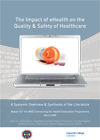 A Systemic Overview & Synthesis of the Literature
A Systemic Overview & Synthesis of the LiteratureReport for the NHS Connecting for Health Evaluation Programme
Josip Car, Ashly Black, Chantelle Anandan, Kathrin Cresswell, Claudia Pagliari, Brian McKinstry, Rob Procter, Azeem Majeed and Aziz Sheikh
- There have been substantial developments in information technology hardware and software capabilities over recent decades and there is now considerable potential to apply these technological developments in relation to aspects of healthcare provision.
- Of particular international interest is the deployment of eHealth applications - that is the use of information technology in healthcare contexts - with a view to improving the quality, safety and efficiency of healthcare.
- Whilst these eHealth technologies have considerable potential to aid professionals in delivering healthcare, the use of these new technologies may also introduce significant new unanticipated risks to patients.
- Also of concern is that even when high quality interventions are developed, they frequently fail to live up to their potential when deployed in the "real world"; a major factor contributing to this paradox is professional resistance to the introduction and use of poorly designed applications.
- Given that the NHS is now committed to the largest eHealth-based modernisation programme in the world, it is appropriate and timely to critically review the international eHealth literature with a view to identifying lessons that can usefully be learnt with respect to the future development, design, deployment and evaluation of eHealth applications.
Download The Impact of eHealth on the Quality & Safety of Healthcare (.pdf, 7.220 KB).
Download from the eHealthNews.EU Portal's mirror: The Impact of eHealth on the Quality & Safety of Healthcare (.pdf, 7.220 KB).
List of authors:
- Dr Chantelle Anandan, Research Fellow
Division of Community Health Sciences: GP Section
University of Edinburgh - Ashly D. Black, Research Assistant
eHealth Unit, Department of Primary Care and Social Medicine
Imperial College London - Dr Josip Car, Director of eHealth Unit
eHealth Unit, Department of Primary Care and Social Medicine
Imperial College London - Kathrin Cresswell, Research Associate
Division of Community Health Sciences: GP Section
University of Edinburgh - Professor Azeem Majeed, Professor of Primary Care and Head of Department
Department of Primary Care and Social Medicine
Imperial College London - Dr Brian McKinstry, Clinical Senior Research Fellow
Division of Community Health Sciences: GP Section
University of Edinburgh - Dr Claudia Pagliari, Senior Lecturer in Primary Care and Chair of eHealth Group
Division of Community Health Sciences: GP Section
University of Edinburgh - Professor Rob Procter, Currently on Secondment as Research Director
National Centre for e-Social Science, Manchester
School of Informatics, University of Edinburgh - Professor Aziz Sheikh, Professor of Primary Care Research & Development
Division of Community Health Sciences: GP Section
University of Edinburgh
Correspondence to:
Professor Aziz Sheikh, Professor of Primary Care Research & Development, Division of Community Health Sciences: GP Section, University of Edinburgh, 20 West Richmond Street Edinburgh EH8 9DX
For further information, please visit: